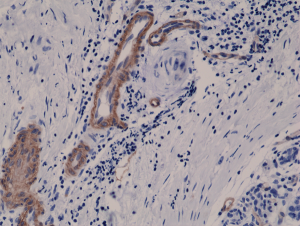anti-CD146 (human) Rabbit Monoclonal (RM249)
| Code | Size | Price |
|---|
| REV-31-1129-00-R100 | 100 ul | £455.00 |
Quantity:
Prices exclude any Taxes / VAT
Overview
Antibody Isotype: Rabbit IgG
Antibody Clonality: Recombinant Antibody
Antibody Clone: RM249
Regulatory Status: RUO
Target Species: Human
Applications:
- Immunohistochemistry (IHC)
- Western Blot (WB)
Shipping:
Blue Ice
Storage:
+4°C
Images
Documents
Further Information
Alternate Names/Synonyms:
Cell Surface Glycoprotein MUC18
Concentration:
N/A
EClass:
32160000
Form (Short):
liquid
Formulation:
Liquid. 50% Glycerol/PBS with 1% BSA and 0.09% sodium azide.
Handling Advice:
Avoid freeze/thaw cycles.
Immunogen:
A synthetic peptide corresponding to the residues near C-terminus of human CD146.
Long Description:
Recombinant Antibody. This antibody reacts to human CD146 (Cell surface glycoprotein MUC18). This antibody may also react to mouse or rat CD146, as predicted by immunogen homology. Applications: WB, IHC. Source: Rabbit. Liquid. 50% Glycerol/PBS with 1% BSA and 0.09% sodium azide. CD146 (MCAM; MUC18) is an integral membrane glycoprotein belonging to the immunoglobulin superfamily. It is a 113kDa cell adhesion molecule currently used as a marker for endothelial cell lineage. CD146 is expressed at cell-cell junctions in all endothelial cells, and has also been observed in other normal and malignant cell types. CD146 functions as a receptor for laminin alpha 4, a matrix molecule that is broadly expressed within the vascular wall. Accordingly, CD146 is highly expressed by cells that are components of the blood vessel wall, including vascular endothelial cells, smooth muscle cells and pericytes. In addition to its recognized role as a calcium-independent cell adhesion molecule, CD146 may also act as a signal transduction molecule in the recruitment of Fyn kinase, and in the subsequent tyrosine-phosphorylation of intracellular proteins involved in actin cytoskeleton assembly. CD146 plays a role in cell adhesion, and in cohesion of the endothelial monolayer at intercellular junctions in vascular tissue. Normal melanocytes do not express CD146, but CD146 expression is positively correlated to melanoma progression.
NCBI, Uniprot Number:
P43121
Package Type:
Vial
Product Description:
CD146 (MCAM; MUC18) is an integral membrane glycoprotein belonging to the immunoglobulin superfamily. It is a 113kDa cell adhesion molecule currently used as a marker for endothelial cell lineage. CD146 is expressed at cell-cell junctions in all endothelial cells, and has also been observed in other normal and malignant cell types. CD146 functions as a receptor for laminin alpha 4, a matrix molecule that is broadly expressed within the vascular wall. Accordingly, CD146 is highly expressed by cells that are components of the blood vessel wall, including vascular endothelial cells, smooth muscle cells and pericytes. In addition to its recognized role as a calcium-independent cell adhesion molecule, CD146 may also act as a signal transduction molecule in the recruitment of Fyn kinase, and in the subsequent tyrosine-phosphorylation of intracellular proteins involved in actin cytoskeleton assembly. CD146 plays a role in cell adhesion, and in cohesion of the endothelial monolayer at intercellular junctions in vascular tissue. Normal melanocytes do not express CD146, but CD146 expression is positively correlated to melanoma progression.
Purity:
Protein A purified.
Source / Host:
Rabbit
Specificity:
This antibody reacts to human CD146 (Cell surface glycoprotein MUC18). This antibody may also react to mouse or rat CD146, as predicted by immunogen homology.
Transportation:
Non-hazardous
UNSPSC Category:
Primary Antibodies
UNSPSC Number:
12352203
Use & Stability:
Stable for at least 1 year after receipt when stored at -20°C.



